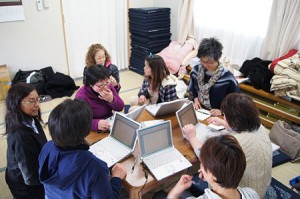東北で被災された女性たちとコミュニケーションをとる様々なワークショップが開催されたが、東日本大震災女性支援ネットワーク(Rise Together)メディアチームが、2月に行ったメディア・ワークショップでは、当初の目的だった写真つきのレポートを完成させることができた。2011年3月11日に東北沿岸を直撃した東日本大震災の一周年は、多くの人にとって「初めて」の経験となった。
 まず、素晴らしい第一歩となったのは、仮設住宅に住む女性たちが、カメラを使い、パソコンで自分たちの物語を書き始めたことである。ワークショップの間中、新しいパソコンのキーボードを懸命に使いこなそうと、明るい笑い声が響いていた。
まず、素晴らしい第一歩となったのは、仮設住宅に住む女性たちが、カメラを使い、パソコンで自分たちの物語を書き始めたことである。ワークショップの間中、新しいパソコンのキーボードを懸命に使いこなそうと、明るい笑い声が響いていた。
「なかなか難しいですね。でも、あきらめませんよ」とわたなべなおこさんは言う。
二児の母であるあべしょうこさんは、タイプミスすると、部屋中に響くほど笑いながら楽しそうに正しい文字に直していく。メディアワークショップに初参加のあべさんは、仮設住宅から車で小一時間かけて、あべまゆみさんと一緒にやってきた。あべまゆみさんは、津波で母を失い、今も遺体を捜しつづけている。
南三陸の女性たちが書いた短い文がスクリーンにゆっくりとあらわれる。東北の女性たちがそれぞれ、おっかなびっくりでキーボードをたたくことは、新たな世界に大きな一歩を踏み出していくことにつながる。
東北地方では考えや感情、意見などのコミュニケーションが、男性によって支配されてきた。保守的な社会に黙って従ってきた女性たちは、家族の生計を維持するために、夫が行う漁業やわかめの養殖を手伝いながら過ごした震災前の日々の暮らしを語った。
家財道具や仕事も壊してしまった大災害から1年たち、女性たちの生活は劇的に変わった。夫が職を取り戻せることを待つのに多くの時間を伴うため、妻たちは、写真やパソコンで文字を書く技術を学ぶことに時間を費やしている。編み物や手芸も、仮設住宅の女性たちに人気のある気晴らしとなった。
「私、やっと女性らしい時間を過ごせたよ。」と家で一生懸命つくった美しい帽子とおそろいの手袋を誇らしげに見せながらわたなべさんは言った。
数年前に結婚して以来、わたなべさんの1日は、午前3時に始まり、漁船で漁にでる夫を支え、わかめの養殖用の網を海に張るためにさらに沖へ出る。仕事や家事・育児をやりくりしながら、わたなべさんの日々はあっという間に過ぎて行った。今は、その頃と一変した。
「外でランチを食べることができるなんて、驚きです。被災前はそんなこと決してできなかった。だって、毎日ものすごく忙しかったから」とまゆみさんは、南三陸での人生の大きな変化についてパソコンを使って書いた。
2つ目に関心をひいたのは、午前の部のワークショップの主役である、あべふみえさんだ。あべさんは、巨大津波が襲ったとき、戸倉の海の近くに家族と義理の父母と住んでおり、難を逃れたが家と家財道具は流された。その経験は大きな喪失感を伴ったが、新しく写真やパソコンで書くという技術を通じて、これらの体験を表現しようと思い、ワークショップに参加した。1年後、その日がやってきたら、かつて住んでいた壊れた家を撮影しようと決めていたのだ。
メディアチームの講師からの課題に対し、グループの他の女性たちは尻込みしたが、あべさんは積極的に前に進んだ。あべさんは、かつての家のコンクリートの基礎のところに立ち、周囲の廃墟を見て恐怖にとらわれていたときは、あえて訪れることのなかった震災後の姿を記録した。
「今は、すべてが変わってしまったけれど、1年後は、自分の人生や時間について前向きに、自分の意思で決める」と書いた。
あべさんの決意は、メディア・ワークショップの活動に参加した友達や仲間にとって強さのシンボルになった。
記録することは、女性たちが現実を見つめ、失ったものに再び向き合うという、大変な挑戦を促す大きな結果をもたらした。
「1年後の今までの時間の経過を、悲しみで後ろを振り返り、現実を直視することで癒されながら、前に進むことができる。それは困難な試練。なぜって、私たちが体験した喪失は、個人的には、壊され続けているから。でも、がんばれるときは来る」とわたなべさんは言った。
●One-Year Later---Voices of Disaster affected Women in Minami Sanriku
After a series of workshops on the importance of effective communication from women in disaster areas in Tohoku, the Rise Together Media Team reached its first goal—completed short reports written neatly and accompanied with photos-- in February. In fact, there were a lot of “First Time” achievements to mark the first anniversary of the Great East Japan Disaster that struck the northeastern coasts on March 11, 2011.
Lets take the first cause for applause—Women living in temporary housing have started to use cameras and computers to write their stories, an experience they had not even dreamed about before. Loud and infectious chuckles broke the silence during the workshops as the group concentrated in mastering the key-boards on their new computers. “This is difficult but I am never going to give-up,” said Ms. Naoko Watanabe. The efforts of Ms. Shoko Abe, mother of two, sent loud guffaws through the room when she typed the wrong letters but then got it right. Abe was participating for the first time in the media workshop, driving almost an hour from her temporary shelter in Natarie to reach the venue. She arrived with Ms. Mayumi Abe, who had lost her mother during the tsunami and continues to search for the body. The short epistles written by the women from Minami Sanriku appeared on the screen slowly, each timid hit on the key- board representing giant steps ahead in the female world in Tohoku where communication of thoughts, emotions and opinions have been dominated by their male counterparts. Resigned to the social conservatism, women in the group explained their pre-disaster daily lives had been consumed with daily work with their husbands who relied on their wives to sustain individual fishing and seaweed cultivation that provided the family income. Now, a year later after the massive disaster that wiped away their belongings and jobs, the lives of women have changed drastically. With more time on their hands as they wait for their husbands to regain collapsed businesses, the women have begun to make time to learn new skills such as photography or writing. Knitting pretty clothes has also become a popular past-time among women in temporary housing. “ I finally have time to feel feminine” explained Watanabe proudly displaying a beautiful hat and matching gloves, the result of her hard work at home. Since she married several years ago, Watanabe used to start her day at 3 am when she work up to accompany her husband in the fishing boat that took them far into the sea to lay nets for cultivating seaweed. The days would pass quickly for her as she juggled work, household chores and looking after the children. That daily schedule has changed now. “It is a special occasion to be able to have lunch out, something I had never done before the disaster because I was very busy with work every day,” wrote Mayumi on her computer, revealing in her message an important change in her life in Minami Sanriku.
The second cause célèbre was achieved in the morning session of the workshop and the heroine was Ms Fumie Abe. Abe was living close to the coast in Togura vicinity with her family and in-laws when the massive tsunami struck. They escaped in time but their house and belonging were swept away. The experience left her with a huge sense of loss. Later, she joined the workshops that taught her to capture these emotions through new photography and writing skills. The big day arrived, a year later, when she decided to take to the devastated site that was once her former home. The assignment was suggested by the media team instructors and while the others in her group declined, she decided to move ahead boldly. Ms Abe stood on the concrete foundation of her home watching the devastation around her and noting that soon after the disaster she did not dare visit the place when she was consumed by fear. “ But, today has been all about change. One year later, I am going ahead in my life and its time for some strong decision-making,” she wrote.
Ms Abe`s decision has been a symbol of strength for her friends and colleagues who have joined the media activities. The importance of recording has raised its profile among women and they face the important challenge of facing their losses again. “One year later marks a journey from the time when we could heal by turning our backs on sorrow to facing it squarely and then moving ahead. It’s a difficult test because the losses we have experienced continue to be devastating on an individual basis. But the time has come to make the effort,” said Ms Watanabe.
Kakuchi Suvendrini
